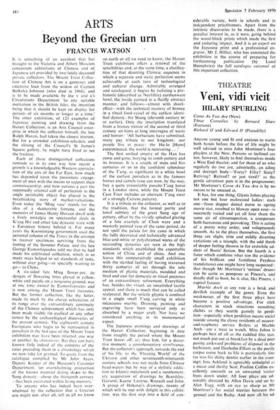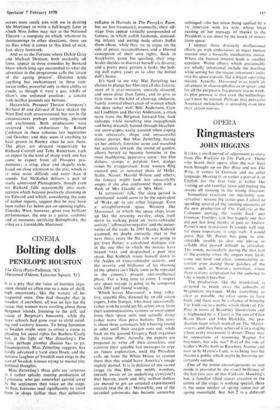THEATRE
Veni, vidi vicit
HILARY SPURLING
Come As You Are (New) Three Comedies by Bernard Shaw (Fortune) Richard II and Edward II (Piccadilly) Anyone young and fit and anxious to warm both hands before the fire of life might be well advised to miss John Mortimer's four playlets at the New. Persons so inclined are not, however, likely to find themselves inside a West End theatre; and for those of us who regularly do (we are, admittedly, an ailing and decrepit body—`Forty? Fifty? Sixty? Retiring? Retired? or just tired?' as the gentle advertiser puts it in the programme), Mr Mortimer's Come As You Are is by no means to be sneezed at.
It has, for one thing, Glynis Johns playing not one but four maltreated ladies: each one—from dapper dental nurse to ageing movie star, rosebud to blowzy open rose—is succinctly varied and yet all four share the same air of circumspection, a composure both humorous and provoking. This is acting of a pretty witty order, and voluptuously smooth. As to the plays themselves, the first three are slight, trite and mildly diverting variations on a triangle, with the odd throb of deeper feeling thrown in for erstwhile ad- dicts of Boots' fiction. But the fourth is a farce which confirms what (on the evidence of his brilliant and fastidious Feydeau translations) one might have long suspected: that though Mr Mortimer's 'serious' drama can be quite as pompous as Pinero's, and deadly dull to boot, he is also, like Pinero, a capital farceur.
Marble Arch at any rate is a brisk and devilish example of the genre. Even the weaknesses of the first three plays here become a positive advantage. For stick characters in stock situations mouthing clichés as they scuttle gamely to perdi- tion—especially when perdition means social suicide among the classy residents of mauve- and-raspberry service flatlets at Marble Arch—are a treat to watch. Miss Johns is perhaps best of all as the raddled film star, not much put out at breakfast by a dead peer posing awkward problems of disposal in the bathroom, and Denholm Elliott as the portly corpse come back to life is particularly fine (as was his shifty dentist earlier in the even- ing); Joss Ackland is agreeably unhelpful as a mean and thrifty Scot, Pauline Collins ex- cellently uncouth as an unwanted visitor from down under. All four plays are ad- mirably directed by Allan Davis and set by Alan Tagg, with an eye as sharp as Mr Mortimer's for social niceties between the genteel and the flashy. And now all his ad- miners must surely join with me in desiring Mr Mortimer to write a full-length farce in which Miss Johns may star at the National Theatre—a company on which, whatever its shortcomings in other directions, there are no flies when it comes to this kind of neat, fast, dizzy footwork.
And so to the Fortune where Dulcie Gray and Michael Denison, both markedly off form, appear in three comedies by Bernard Shaw which long ago succumbed to what the advertiser in the programme calls the 'strain of the ageing process'. Distance lends anything but enchantment to these sten- torian trifles, powerful only in their ability to exude, as though it were a gas, whiffs of Shaw's one unforced emotion: a conceit with neither grounds nor bottom.
Meanwhile, Prospect Theatre Company's Richard II and Edward II have shaken the West End with unaccustomed, but not in the circumstances perhaps surprising, pleasure and excitement. Both productions were reviewed with enthusiasm by Robert Cushman in these columns last September and October, and they seem if anything to have grown in fluency since he saw them. The plays are directed respectively by Richard Cottrell and Toby Robertson, each an expert in the kind of sharp work one has come to expect from all Prospect pro- ductions: a crisp, clear and shapely style, based on close attention to the text, which is at once more difficult and rarer than it sounds. Ian McKellen delivers a pair of nicely contrasted Plantagenets, though even his Richard falls occasionally into man- nerisms which become positively alarming in his Edward and which, considering the tone of earlier reports, suggest that he may have been rather far below par on opening nights. Timothy West, however, gives two brilliant performances, the one as a grave, sardonic and at moments terrifying Bolingbroke, the other as a formidable Mortimer.



































 Previous page
Previous page